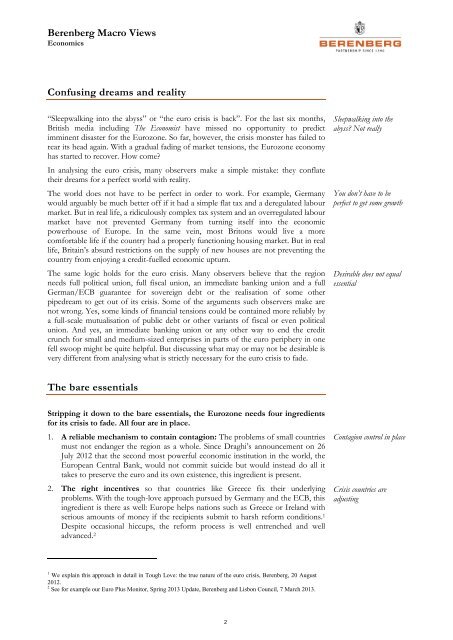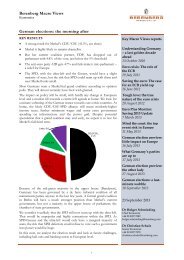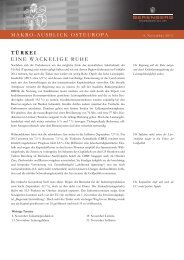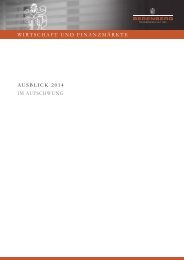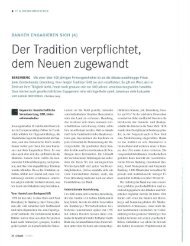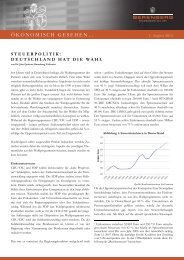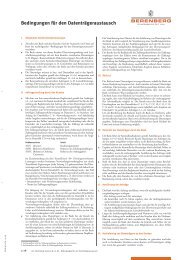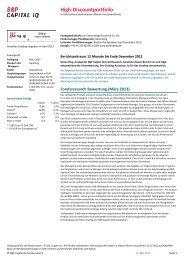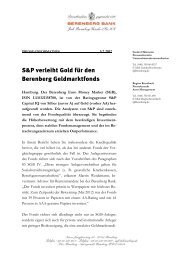full report and disclosures - Berenberg Bank
full report and disclosures - Berenberg Bank
full report and disclosures - Berenberg Bank
You also want an ePaper? Increase the reach of your titles
YUMPU automatically turns print PDFs into web optimized ePapers that Google loves.
<strong>Berenberg</strong> Macro Views<br />
Economics<br />
Confusing dreams <strong>and</strong> reality<br />
“Sleepwalking into the abyss” or “the euro crisis is back”. For the last six months,<br />
British media including The Economist have missed no opportunity to predict<br />
imminent disaster for the Eurozone. So far, however, the crisis monster has failed to<br />
rear its head again. With a gradual fading of market tensions, the Eurozone economy<br />
has started to recover. How come?<br />
In analysing the euro crisis, many observers make a simple mistake: they conflate<br />
their dreams for a perfect world with reality.<br />
The world does not have to be perfect in order to work. For example, Germany<br />
would arguably be much better off if it had a simple flat tax <strong>and</strong> a deregulated labour<br />
market. But in real life, a ridiculously complex tax system <strong>and</strong> an overregulated labour<br />
market have not prevented Germany from turning itself into the economic<br />
powerhouse of Europe. In the same vein, most Britons would live a more<br />
comfortable life if the country had a properly functioning housing market. But in real<br />
life, Britain’s absurd restrictions on the supply of new houses are not preventing the<br />
country from enjoying a credit-fuelled economic upturn.<br />
The same logic holds for the euro crisis. Many observers believe that the region<br />
needs <strong>full</strong> political union, <strong>full</strong> fiscal union, an immediate banking union <strong>and</strong> a <strong>full</strong><br />
German/ECB guarantee for sovereign debt or the realisation of some other<br />
pipedream to get out of its crisis. Some of the arguments such observers make are<br />
not wrong. Yes, some kinds of financial tensions could be contained more reliably by<br />
a <strong>full</strong>-scale mutualisation of public debt or other variants of fiscal or even political<br />
union. And yes, an immediate banking union or any other way to end the credit<br />
crunch for small <strong>and</strong> medium-sized enterprises in parts of the euro periphery in one<br />
fell swoop might be quite helpful. But discussing what may or may not be desirable is<br />
very different from analysing what is strictly necessary for the euro crisis to fade.<br />
Sleepwalking into the<br />
abyss? Not really<br />
You don’t have to be<br />
perfect to get some growth<br />
Desirable does not equal<br />
essential<br />
The bare essentials<br />
Stripping it down to the bare essentials, the Eurozone needs four ingredients<br />
for its crisis to fade. All four are in place.<br />
1. A reliable mechanism to contain contagion: The problems of small countries<br />
must not endanger the region as a whole. Since Draghi’s announcement on 26<br />
July 2012 that the second most powerful economic institution in the world, the<br />
European Central <strong>Bank</strong>, would not commit suicide but would instead do all it<br />
takes to preserve the euro <strong>and</strong> its own existence, this ingredient is present.<br />
2. The right incentives so that countries like Greece fix their underlying<br />
problems. With the tough-love approach pursued by Germany <strong>and</strong> the ECB, this<br />
ingredient is there as well: Europe helps nations such as Greece or Irel<strong>and</strong> with<br />
serious amounts of money if the recipients submit to harsh reform conditions. 1<br />
Despite occasional hiccups, the reform process is well entrenched <strong>and</strong> well<br />
advanced. 2<br />
Contagion control in place<br />
Crisis countries are<br />
adjusting<br />
1 We explain this approach in detail in Tough Love: the true nature of the euro crisis, <strong>Berenberg</strong>, 20 August<br />
2012.<br />
2 See for example our Euro Plus Monitor, Spring 2013 Update, <strong>Berenberg</strong> <strong>and</strong> Lisbon Council, 7 March 2013.<br />
2


